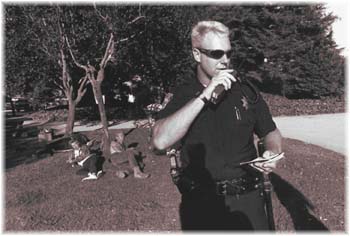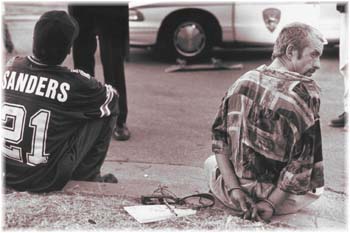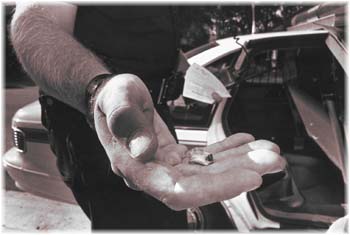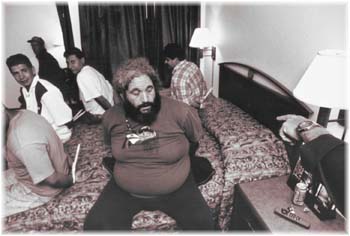![[MetroActive News&Issues]](/gifs/news468.gif)
![[MetroActive News&Issues]](/gifs/news468.gif)
[ Features Index | Metro Santa Cruz | MetroActive Central | Archives ]
Scenes of the Crime
Paper Trail: Santa Cruz officer Dan Brierley checks for warrants on a few homeless people found sleeping in San Lorenzo Park.
Sex and drugs and rock & roll--they're plentiful in Surf City and all in a night's work for the Santa Cruz Police Department
By Traci Hukill
THE PATROL CAR KEPT sprouting drugs. Well, twice--once just before Officer Dan Brierley's shift began and then again a few hours later. We'd open up the back door, and there would be a couple of thumbnail-sized wads of heroin wrapped in plastic on the floorboard. Then Brierley, who's been with the Santa Cruz Police Department for two years, would fill out the appropriate paperwork, open up the trunk of his car and drop the drugs in an evidence bag.
"Smells kind of like vinegar," he said the first time, offering us a sniff of the tarry stuff. "See?" All I could detect was a hint of chocolate on his hands, but I nodded anyway. Metro Santa Cruz photographer Robert Scheer frowned and sniffed again. I don't think he smelled vinegar, either.
The episode was metonymic for the whole evening. Evidence of wrongdoing would present itself, Officer Brierley would check it out, fill out a copious amount of paperwork, and the Metro Santa Cruz Investigative Reporting Team, participating in an SCPD "ride-along" for the evening, would feel vaguely let down and wonder when the bullets were going to start flying so we could get some good pictures.
Criminals, it turns out, are like pets: When you want them to perform for an audience, they play dumb. Besides, Santa Cruz is not a place where bullets fly with any regularity. So our morbid hunt for drama at the expense of others would be difficult.
Difficult, perhaps, but not fruitless. We found some action. We learned where users go to score heroin. We witnessed some genuine human drama, met a few shady characters, even saw some street violence. And when Santa Cruz failed to yield big-city crime, the police coaxed some out of the woodwork with a midnight sting operation.
For now, though, the sun was still up, and we were cruising around town, learning a little piece of what it is to be a police officer on patrol. And it had nothing to do with hanging out in donut shops.
Tramps and Thieves
IN HAWAII THEY CALL IT stinkeye--the ill-tempered, challenging stare reserved for people who aren't welcome in a given locale. In Hawaii that means tourists. In the Beach Flats, in San Lorenzo Park, on Coral Street and in front of the Asti Cafe after midnight, that means cops.
Young males, invariably Caucasian, went out of their way to be rude to officers in that silky way rich white boys have mastered, calling out things like, "Isn't there real crime happening somewhere?" in voices dripping with sarcasm.
Others didn't give stinkeye at all, just drove too slowly in front of us and hesitated at four-way stops.
After citing a motorist for carrying a passenger in the back of his truck--"one of my pet peeves"--Officer Brierley took us on a jaunt through San Lorenzo Park on the access road. Riffraff in parks are another one of his pet peeves.
"See them?" he pointed to a few Hispanic guys hanging out on the bridge, watching us drive by. "They're selling heroin. They usually make the transaction down there by the levee, where they can see us from all directions. And these over here," he said as we rounded a turn near a knoll, "are our drunks." He stopped the car and we got out.
Officer Brierley is a big, strapping guy, a 27-year-old ex-Marine who went to the police academy at Evergreen Valley College after picking up a bachelor's degree in political science at San Jose State University. He wears his blond hair cropped short. He gets called a Nazi a lot.
He's also a pretty nice guy. He greeted the ragtag trio cordially.
"You all haven't been drinking tonight, have you?" he inquired.
"Oh, no, sir," responded a leather-faced woman with elaborate politeness.
"What about you, Tim?"
"Naw, we're just hangin' out," one of the men answered, flashing a charming, if toothless, grin. At that point their other friend began to babble incoherently.
"What's wrong with your leg?" Brierley asked the woman over the din of the chattering man. The skin showing between her sock and pants was covered in sores. She rubbed it and mumbled something about a rash. "You should take care of that," he said, and went on to check on three more people hovering near the bathrooms.
All of these vagabonds were apparently intoxicated. But Brierley didn't haul any of them in or issue any tickets.
"It costs the taxpayers $103 each time you book a drunk," he told us when we got back in the car.
Our next call was in response to a shoplifting at Graphics Pleasure, a head shop on lower Pacific. Raza Hamad, the agitated proprietor, was waving us down as we neared the Metro bus station. He pointed frantically at a tall guy in shorts walking away from the squad car.
The guy in shorts turned out to be the alleged culprit's friend. Though cooperative, he wasn't much help. He had joined "Jonathan" on the road while hitchhiking from Virginia, he said, and didn't even know the guy's last name.
The thief, Hamad explained, had worked in the shop for the day. When the time came for compensation, he and Hamad had disagreed and the worker helped himself to a $65 pipe.
Perhaps he was just trying to fit in with the local demi-monde. In terms of sheer numbers, larceny (which includes shoplifting, theft from vehicles and bike theft) is the most common offense in Santa Cruz. Tonight was no exception. In the 24-hour period starting with our ride-along at 5:30pm on Friday, Aug. 15 and ending the next afternoon, the SCPD dispatchers fielded four calls for theft and five for shoplifting, in addition to nine for burglary and one for a stolen car. Since most thieves are smart enough to leave an area once they've stolen, the vast majority of those calls resulted in nothing more than a report. In this case, not even that.
Officer Brierley took a few notes from Hamad and talked to the friend for a while before sending him on his way with a dire warning of what would happen to Jonathan if the cops ran across his white Chevy van. Hamad chose not to file a report since all he wanted was his pipe back, so Officer Brierley skipped the paperwork.
Cuff Luck: City of Santa Cruz police officers arrest a man (right) with an outstanding warrant on suspicion of providing alcohol to a minor.
Park After Dark
AS WE MADE A SPIN around Mike Fox Park, better known as the tennis courts at San Lorenzo and Riverside, I tried flexing some of my reportorial muscles. You know, asking the tough questions like the big-time journalists do. Making 'em squirm.
I fixed Brierley with a no-nonsense glare and fired.
"So, you probably partied when you were in high school, right? Drank a few beers and drove sometimes, maybe even smoked a little pot ... So how does it feel busting kids for doing the same things you used to do?"
But Brierley was unflappable. Oh, he grinned and maybe turned a half-shade of pink. But he didn't squirm.
"All I can say is you knew it was illegal then," he said. "I don't cut 'em much slack 'cause with alcohol, they should know better."
We had just seen three kids leave their place at a picnic table in the park once they spotted us. Officer Brierley shined his flashlight into a drainpipe and a utility box--two favorite hiding places for drugs and paraphernalia. Finding nothing, we were on our way through a lower Ocean Street neighborhood when we saw the trio again. This time it was clear that two were teenagers, the other a small, slight man who looked considerably older. Officer Brierley stopped the car and addressed the older one.
"Why did you run away from me back there, Savin?"
"I wasn't running. We were just walking."
"Bullshit. I'm not stupid. How old are you two?" he asked the others.
"I'm 16."
"I'm 17."
"Why are you hanging around with him?" He jerked his head toward Savin Lopez, whom he'd encountered on numerous occasions under similar circumstances.
"He's an old friend of ours."
"Have you been drinking?"
"No, sir."
And so on, until Officer Brierley said, "Why don't you lift up your shirts for me?" Sure enough, the 17-year-old had a flask of tequila tucked in the waistband of his pants.
Brierley searched his pockets and the other kid's and came up with cigarettes, a lighter, a pipe and a baggie. He smelled the contents of the bag and snorted with derision.
"You guys'd get beat up if you tried to sell this," he said.
"Why?" asked one of the kids gathered around.
"It's grass--you know, grass from the lawn."
A couple of bystanders snickered.
Brierley went to his car and called Savin Lopez's ID number in to his dispatcher, then walked back to the group. "Stand up, Savin."
"Am I goin' to jail?"
"Yep. There's a warrant out on you." He slipped the cuffs on. The 45-year-old Lopez, who stands all of 4 feet, 11 inches and weighs about 100 pounds, offered no resistance.
"When do I go to court?" he asked plaintively.
"I don't know. Not before Monday."
"So, what, I'll go all this weekend in jail?"
"Yep."
And then Lopez, who had been swaggering like an aged adolescent, deflated. He sat down on the curb in his baggy pants and oversized shirt and hung his bleached-blond head--half troubled kid and half defeated old man. The two teenagers, instantly sensing that his predicament was more dire than their own, relaxed. They walked with citations for possession of tobacco and alcohol. Just before they left they said, a little awkwardly, "See you around," but Lopez barely lifted his head.
Smack Attack: Officer Dan Brierley shows a minute quantity of heroin that had been stashed in his squad car by a detainee. He later filed it as evidence.
Sex and Drugs ...
LOPEZ'S POCKETS GAVE UP a pencil torch, a broken glass pipe and a small packet of white powder he insisted was crushed Tylenol and codeine. (We were skeptical, but it turned out to be true.) Brierley set about completing scads more paperwork and called another officer to take Lopez to the county jail for booking since there was no room in his own car. We all drove to the jail.
After booking Lopez, Brierley took us on a tour of Beach Flats. It was still pretty early, about 9pm, and people were just starting to congregate on the corners.
Santa Cruz, like a lot of West Coast cities, has experienced a revival in the popularity of heroin. Police say Beach Flats and San Lorenzo Park are the most popular distribution points for the new drug of choice.
"The guys that sell have these 14-year-old girlfriends," Brierley told us. "The girls sometimes hold the drugs for them, sometimes just stand there."
We cruised slowly up Leibrandt and turned on Raymond, just behind the community center. A few shadows melted back into the darkness.
"This is where they drink and sniff spray paint," he said as he got out to pick up a red low-rider bicycle leaning against a fence. "Bikes are the most traded thing for dope," he explained as we headed back to the station to put it in the cage and, yes, complete more paperwork.
Brierley drove us to an alley not far from the Ocean Street motel where the Neighborhood Enforcement Team had set up a temporary field command post. He wished us well and drove away.
Citizens of the neighborhoods along lower Ocean Street are fed up with the drug activity that they feel is encouraged by the presence of street prostitutes in the area. Also, in this day of death by sexually transmitted disease, they fear the deadly litter (used condoms and needles) that prostitutes and their Johns sometimes leave behind.
"We do it because we're genuinely trying to improve the quality of life in that neighborhood," explains Patty Sapone, an SCPD spokesperson. "Sometimes the prostitutes will do their business in the cars and go to a quiet street to do it. Any neighborhood would complain about that."
According to the arrangement, we walked to a nearby convenience store, where we met a skulking young man in a sweatshirt--Sgt. Steve Clark, a.k.a. Regular Guy. As we casually made our way to the motel he gave us the rundown: Two decoys--policewomen dressed for the part--were going out onto the street one at a time with concealed radios, which would be monitored by an officer parked in a nearby lot. Clark and a couple of other undercover officers, also wearing radios, were following the women from a casual distance and waiting for a verbal cue or a gesture that told them a deal had been struck and they were headed back to the motel. Once the decoy and the John were inside the building and headed up the stairs, undercover officers trapped them on the landing from above and below. By then the Johns were sitting ducks.
Hooker Snookered: A Friday night prostitution sting led by Santa Cruz police officers resulted in the arrest of 13 men, some of whom are pictured here.
... and Rock & Roll
THE CRAMPED SECOND-FLOOR rooms acting as temporary headquarters were all a-bustle with activity. In one room, two uniformed police officers took information from a crestfallen man and put his personal effects in a paper bag with his name scrawled on it with marker. The money he'd offered, they told him, would be forfeited as evidence.
Meanwhile, Mike Pruger of the NET team burst into song now and then, bawling a few bars from the 1979 hit made popular, appropriately, by The Police: "Roxanne/You don't have to put on the red light/Those days are over/You don't have to sell your body to the night ..." The theme song for the night, it resulted in fresh hilarity each time someone sang the refrain, which was often.
In the corner two women in tacky outfits pecked away at their laptops, writing up reports on the guys they'd just taken down. They compared experiences with an air of friendly competition.
"Twenty dollars," muttered one. "The cheap bastard."
In an adjoining room, a few busted Johns sat on the side of the bed, their hands cuffed behind them, morosely watching a TV movie on a tiny set. If you squinted, the whole scene began to resemble a hazing party, with one group guffawing and enjoying themselves and another group awash in shame. Thirtysomethings in jeans and flannels--the adult professional's idea of street clothes--streamed in and out of the rooms, cracking jokes and singing the overworked lyrics to the Police song.
"My mom bought me these boots the first time I went undercover," said NET member Christi "Sparky" Bentley, showing off her stiletto-heeled footwear. "They're prostitution boots."
"Sparky brings 'em in four at a time," called out one of the officers with a wink. Bentley rolled her eyes.
It was Reserve Deputy Sheriff Chris Card's turn to go out. The last we saw of her tight-jeaned, fringe-jacketed form, she was heading down the stairs with a lollipop in her mouth. In no time flat she was back with two Johns. I asked her how it happened. Poetic it was not, but it was to the point.
"I asked him if he wanted a date and he said yes," she told me. "I asked, 'What do you want?' He said, 'Fuck.' I said, 'That's $40. Does your friend want to join us?' He said, 'He's getting beer.' I settled for both for $40."
Like anyone else raised on TV cop shows, I have heard of something called "entrapment." I had to wonder, wasn't that an example?
According to assistant district attorney Bob Noonan, that exchange doesn't constitute entrapment. "Asking for a date isn't illegal," he says. " 'Entrapment' means they pressure a person or talk him into doing something he wouldn't ordinarily do."
The next time one of the decoys went out, I waited in the second-floor stairwell with officers Bill Azua, Juan Gallegos and Joe Rodriguez.
"We've never really had to get into it with anybody," Azua said. "When they're caught, they're caught. We make it fun. We say, 'Welcome to the police department."
He paused and listened to his monitor. "She's made contact," he told the others. He thought a moment. "The sad thing is, most of these guys are Hispanic."
He was right. All but three of the 13 Johns eventually cited that night for soliciting the services of a prostitute were Latinos, and most of them spoke halting English.
Azua got the cue to start down the stairs. He and Rodriguez moved casually at first, so as not to give themselves away.
"Let's go get some beer," Azua was saying as decoy Maria Orozco and her John reached the landing. Within seconds the man was surrounded, someone said, "Santa Cruz Police," and they handcuffed him. Another cop said, in a genuinely nice way, "Just one of those things, man."
The guy looked up the stairs at me and shrugged unhappily.
"Dad always told me I learned the hard way," he said in a shaky attempt at humor.
Night at the Fights
THE NET TEAM WRAPPED UP its operation a little after midnight, and we headed back downtown with Officer Nick Richards, new this year to the police force and still saddled with the graveyard shift. But it turns out that one man's poison is another's preference. Richards, a serious guy, says he actually likes working graveyard. He says it gives him time to ferret out the city's favored drug-dealing spots. He drove us past two such places in Beach Flats, where he'd busted some guys making a deal late the previous night.
Now, though, was drunk time. Party time. Fight time.
Officer Richards took us through Beach Flats a few more times, then around Pacific and down Front Street. We made a few calls to noisy parties, Officer Richards asked some visiting Englishmen to pour out their beers and we checked some suspicious individuals.
About 1:30am, we rounded the corner from Cathcart to Pacific just in time to see two guys lurching through the crowd in front of the Catalyst, throwing clumsy punches at each other.
Richards was out of the car and breaking the fight up in seconds while the crowd gathered and the two pugilists spat insults at each other.
"Sit down and be quiet!" Richards ordered. The younger of the two, Robert Matthew, complied, shaking his long hair out of his face disgustedly.
"I said, sit down," Richards repeated. The older guy, George Edwards, started spluttering.
"Sit down, or I'm going to make you sit down," Richards said, striding forward and swooping Edwards' arm up behind his back. Edwards howled.
"I can't sit down! The wall's in my way!"
In one fast, effective motion, Richards swept Edwards' feet out from under him and cuffed his hands behind him.
"I don't want to hurt you, but you didn't sit down when I asked," he said amid Edwards' curses.
Later Edwards changed his tune and was all contrition.
"Hey, I wasn't fighting you back there, man," he whimpered to Richards as the crowd dispersed.
No one filed charges. Just before he released Edwards, Richards had him sign a form. The paperwork had reared its ugly head again.
"This is a form to say you were in handcuffs and have been released without being arrested," he said, picking up Edwards' ball cap off the sidewalk and placing it on his head.
"OK," Edwards said, eager to cooperate. "Where do I sign?"
Later, Brierley reflected on our ride-along.
"That was a really slow night, actually," he said.
Statistically, though, it was not altogether unusual. Santa Cruz's crime profile looks pretty tame in comparison to what we see on TV and hear about bigger cities.
Last year, only two homicides were reported, only two convenience stores were robbed and only 16 pockets were reported picked.
Mostly, when our local law enforcement officers are called on, it is to deal with theft, burglary, assault or domestic violence. Their proactive efforts often focus on drugs and alcohol because, Sapone says, most of our crime is related indirectly to those problems.
The increased use of heroin and methamphetamine colors the overall crime report a shade darker and suggests that our crime profile could get worse.
Santa Cruz's police do not have to feel like they're entering a war zone with each shift.
But at the back of a cop's mind is always the awareness that anything could happen at any time.
Brierley put it this way when I asked him why cops always descend en masse at seemingly insignificant calls.

Robert Scheer
Robert Scheer
Robert Scheer 
Robert Scheer